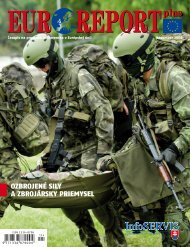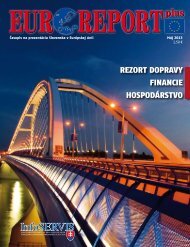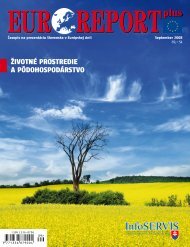Otvoriť - EUROREPORT plus
Otvoriť - EUROREPORT plus
Otvoriť - EUROREPORT plus
Create successful ePaper yourself
Turn your PDF publications into a flip-book with our unique Google optimized e-Paper software.
Summary<br />
Let me kindly point out that under Poland<br />
Chairmanship era there were fifty-three<br />
brand-new legal rules signed and more<br />
than one hundred cases were accomplished<br />
on the EU Council level. Under not easy<br />
circumstances we succeeded to conclude<br />
many negotiations of high importance, e.g.<br />
„the six measures package”, to complete<br />
the EU integration procedure of Croatia, to<br />
terminate the talks on the association treaty<br />
with the Ukraine and to sustain the Eastern<br />
Partnership issue in the EU agenda being<br />
significant for all the countries of the region.<br />
Further, we reached that a decision was<br />
adopted on establishing the European Fund<br />
for Democracy and last but not least that<br />
the EU Council procedure was controlled<br />
efficiently. Politicians and diplomats of other<br />
member countries have agreed upon that<br />
position of Poland in the EU got strengthened<br />
after the chairing term expired.<br />
■■ The Government of Poland has outlined<br />
and determined the reforms in a row to be<br />
implemented. Many of them seem to be unpopular.<br />
What is the standpoint of the Poles<br />
and which reforms have been already launched?<br />
Painful reforms inevitable under the<br />
crises are always unpopular. Poland is not<br />
an exception. However, the ruling Cabinet<br />
of Poland succeeded to trace its „modus<br />
vivendi” and to balance the inevitability to<br />
launch those reforms and to sustain a backup<br />
of the society. To be frank we would fail to<br />
implement any reform without the support<br />
of the society. Both economic achievements<br />
of ours over the past years and the abovesaid<br />
2012 prospects are the best proof of<br />
evidence that our governmental policy is<br />
correct.<br />
Obviously, launching some of the reforms<br />
brings problems and conflicts. Introduction<br />
of the law early this year which is regulating<br />
the terms of medicines refund is the case.<br />
The issue is of importance from the social<br />
and economic viewpoints. In the past the<br />
favourable societal climate governing Poland<br />
assisted the pressing issues of this kind to<br />
have been always solved out.<br />
■■ After Poland’s accession to the EU, the country<br />
got obliged to accept common currency.<br />
How do the Poles perceive the euro problems<br />
and stagnation due to the EU crisis?<br />
The Poles similarly to citizens of other<br />
member countries in the past which had<br />
already introduced euro, are declaring<br />
their tightness to national currency. This,<br />
however, has no interlink with the fact<br />
that Poland got obliged to accept common<br />
currency after the EU entry. The ruling<br />
Foto: archív<br />
Cabinet of Poland is ready to take final<br />
steps to reach the goal. Current Euro-zone<br />
standing is nothing but pessimism and<br />
the Poles are concerned with the raised<br />
problems in some Euro-zone countries.<br />
Globally speaking, we remain to be<br />
optimists so thus, we may predict that<br />
after the existing problems in Euro-zone<br />
are solved out the Poles may support the<br />
introduction of euro currency.<br />
Excerpt from an Interview with<br />
the Foreign Affairs Minister of the<br />
Slovak Republic, Mikuláš Dzurinda<br />
■■ The Republic of Poland was chairing the<br />
EU after Hungary when Slovakia’s one year<br />
V4 leadership had come to an end. What impulses<br />
have been delivered to Poland by the<br />
Visegrad Group?<br />
The Eastern Partnership agenda turned<br />
to be the most significant priority headed<br />
by Poland being in Chairmanship. It is the<br />
all V4 countries priority. We did back-up<br />
the steps taken by chairing Poland aimed at<br />
prime targets: to strengthen and to extent<br />
cooperation with our Eastern partners. Just<br />
under the EU Chairmanship of Poland,<br />
the V4 Group agreed to design a new<br />
programme of the International Visegrad<br />
Fund determined to support civic society,<br />
reforms and democracy in six Eastern<br />
Partnership countries. The V4 Group<br />
launched impulses needed to sustain<br />
dynamics and accessibility of the procedure<br />
targeted to the European Union expansion<br />
primarily on the Western Balkan. Thanks to<br />
the V4 Group, Croatia will be the 28th EU<br />
member country next year.<br />
■■ Radoslaw Szikorski, Polish counterpart of<br />
yours, addressed a historical challenge in Berlin<br />
last November: “I request from Germany<br />
to help the Euro-zone to survive and prosper<br />
for the sake of all countries involved. You are<br />
quite concerned that no one else can do so.”<br />
Mr Szikorski delivered his concern about Germany’s<br />
inactivity more than about German<br />
force. Are those words of the grounds?<br />
It is obvious that any Euro-zone country<br />
and so does the EU really cares to have<br />
the Euro-zone to its entirety. Germany, of<br />
course, also cares about entire Euro-zone<br />
showing its responsible approach towards<br />
the debt crisis. Therefore, it would be unfair<br />
to blame Germany from being inactive.<br />
Principally speaking, I can understand Mr<br />
Szikorski, the Foreign Affairs Minister,<br />
saying that he emphasizes an importance<br />
of Germany to save euro. We<br />
are aware of that Germany is<br />
the key Euro-zone member and<br />
the most important economy.<br />
Jointly with France both of them<br />
are representing the Euro-zone’s<br />
„economic drive”.<br />
■■ Which steps made by Poland under<br />
the EU Chairmanship do you<br />
consider of the utmost contribution?<br />
Preceding Chairmanship of<br />
Poland can be assessed positively.<br />
It was demanding and tough<br />
job as debt crisis in Euro-zone<br />
dominated over other pressing<br />
issues the most. Just at the<br />
beginning the treaty reached with the<br />
European Parliament and six legislative<br />
drafts adopted in order to enforce<br />
economic management were of the<br />
extraordinarily important contribution.<br />
Poland in Chairmanship was active to<br />
back up cohesion first. So we do assess<br />
positively the negotiations headed by<br />
Poland in interest of future multiannual<br />
finance framework to be adopted.<br />
On the European Council session in<br />
December, the tentative agreement was<br />
reached on fiscal union. Therefore, it is my<br />
wish that strengthening of economic control<br />
that is continual procedure is doing well.<br />
Concurrently I am not happy to say that<br />
compliance with alterations to the European<br />
contracts to be made at EU27 failed.<br />
From the viewpoint of Slovakia’s valuebased<br />
foreign policy I appreciate the<br />
Eastern Partnership summit was held, so<br />
thus, new stimuli were raised to develop it<br />
further. I consider extremely important that<br />
the policy of expansion was approved to<br />
be continued. Successful accomplishment<br />
of integration efforts made by Croatia is<br />
signing of accession agreement at the end<br />
of Chairmanship of Poland.<br />
<br />
English-written by © Mária Vrabcová<br />
78 Časopis na prezentáciu Slovenska v Európskej únii

















